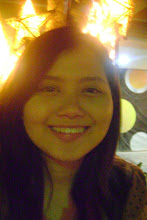
BIYAHENG LUPA
Written, Produced and Directed by Armando Lao
I know what happens next. I will feel jitters. The moment I feel my hair tingling, then I’d know I’m inches away from chickening out.
Can you blame me for being scared? After all, I’m just a student, so can you say I’m wrong for feeling this way, frightened at the thought of punching another letter in my keyboard, when I’m about to write a review, a reaction paper at the least, about my scriptwriting mentor Armando “Bing” Lao’s directorial debut?
And it doesn’t help that I have yet to finish the course, and still feeling my way around what Sir Bing calls epiphanies and trying to grasp the principles of “real time”.
For those who are not familiar with Pinoy film industry, Armando Lao is a well-respected and highly accomplished screenplay writer and creative producer. He has written numerous screenplays for mainstream cinema like Minsan Pa (2004), La Vida Rosa (2001), Tuhog (2001). Sana Pagibig Na (1998), Pila-Balde (1999), among others in a long list. But starting 2006, Armando Lao u-turned to independent cinema and his creative genius paved the way to international acclaim, with films like Kubrador (2006), Serbis (2008) and Kinatay (2009), which won the 62nd Cannes Film Festival Best Director award for Brillante Mendoza, a director who was mentored by Bing Lao himself.
Not the usual screenplay writer who finishes the script and lets the director do all the interpretation, perhaps visits the shooting a day or two, Armando Lao is in for the long overhaul—he does the research, he writes, he executive produces and sits down with the editor and director. “It’s a partnership between the writer and director,” Sir Bing stresses in class. He believes both Writer and Director are the filmmakers. But in cases when the Director and Writer is the same person, then he or she is called an Auteur Filmmaker.
And a few years shy from 2010, Sir Bing Lao decided to complete his creative process. After all, he's been a filmmaker all these years now. So when his good friend Atty. Joji Alonso read the script and told him, "You should direct this, Bing!", it was the natural thing to do--to be an auteur filmmaker himself.
The whole story of Biyaheng Lupa (English title: Soliloquy) takes place inside a bus bound from Manila to Bicol, a bus ride most of us Pinoys are familiar with. There's the boredom of a 12-hour ride-- if we're not sleeping and watching a movie, we entertain ourselves with looking at our co-passengers, curious where they're going, what kinds of person they are, etc.
And it is this curiosity that keeps the film going.
Bing Lao gathers a motley crew of passengers, each with his/her own story, destination, with his or her own quirk. And some, with deep secrets. One old woman is an ex-convict, who used to be a drug-pusher. Helen (Jaclyn Jose) is a married woman having an affair. Smitten by the bus conductor, Lillia (Angel Aquino) is a town gossip searching for true love. Alex is a thriving virgin coconut oil salesman. Then there’s Irene (Eugene Domningo), who is about to leave her son for a menial job abroad; Mickie, a handsome deaf-mute who visits his dead mother's tomb; and Obet, a young man who turns aways from filial duty to start a new life in Bicol.
All the characters form a certain chemistry, inflicting drama, suspense and even humor. Put together, these individuals are about to find out they're in for the ride of their lives, as inner demons are revealed, hearts are broken and mended, and the thin line between fate and destiny is challenged.
Unforgettable in Biyaheng Lupa is the use of the bus door device. When the door is open, real time mode is used, where we hear the passengers and even peddlers and civilians outside communicating in the normal way. But once the door is closed, I am immediately enclosed in a claustrophobic, four-cornered bus, where my mind floats from one person's thoughts to the next. In this "mode", gestures and observations are crucial to understanding the film, as well as the thoughts that we hear constantly buzzing in our ears.
Though using "poetic time" mode, the stories and the characters are realistic, each jump from one character to the next seamless. At first, the film showed an ending for each passenger that reached their destination. Thinking that this will be pursued for all of the characters, I was disappointed when some of them just disappeared like thin air, just like Eugene Domingo's role.
Technical glitches aside, Biyaheng Lupa is a bus ride I'd gladly take for the second time, perhaps with some u-turns and more screeching brakes, where characters can collide more in a jolting manner. And yes, watching the film was like being in the UFO workshop, where I point out in my head every device Sir has taught us. But to tell you what are these "devices" would not be appropriate. Why? Cause I'll be giving out confidential matters. And I wouldn't want to risk being kicked out of Sir's mentoring as if it's not enough I decided to blog about this, you know. :-)

No comments:
Post a Comment